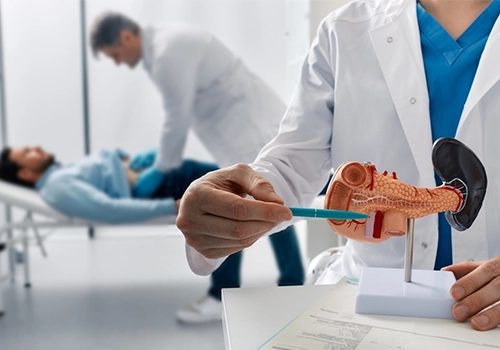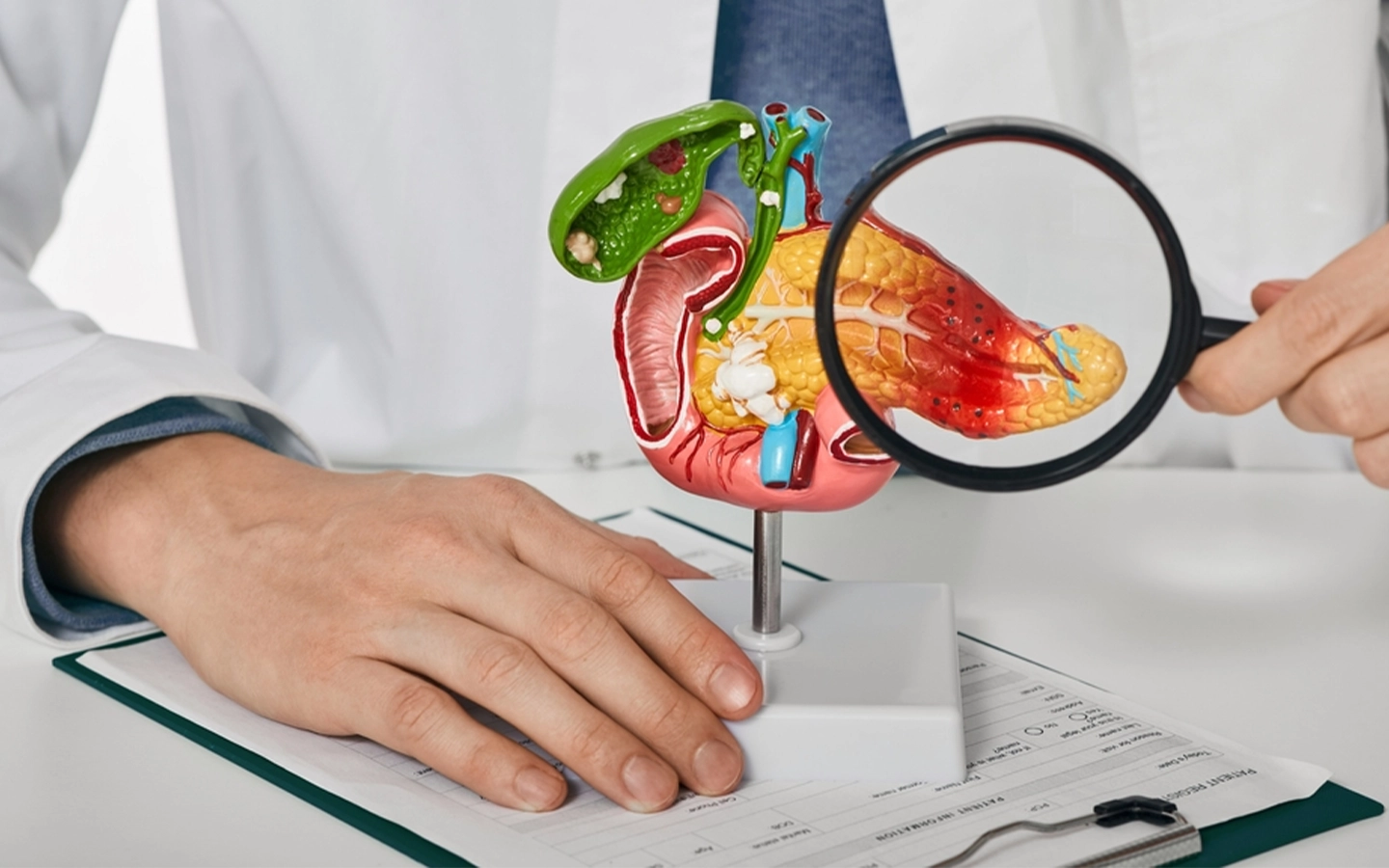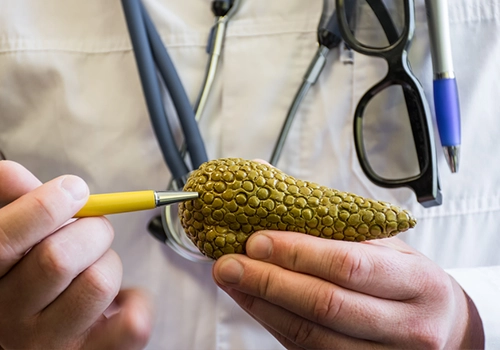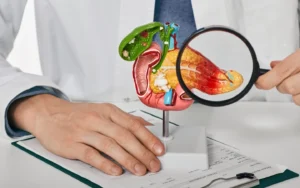Pancreatic Cancer (Pancreatic Carcinoma)
It is crucial to note that the presence or occurrence of specific symptoms does not necessarily indicate the presence of cancer. Readers of this article should be aware that self-examination and personal assessment by non-specialists should not lead to fear or anxiety. Instead, it is important to remember that medical advancements have significantly increased the success rates of various cancer treatments, and taking timely action can greatly aid in reducing the impact of treatment.
Pancreatic cancer, also known as pancreatic carcinoma, is often diagnosed in older individuals, with nearly 60% of cases occurring in people aged 75 or older. In contrast, pancreatic cancer is relatively uncommon among individuals under 40, affecting men and women equally.
Understanding the Pancreas or Gastric Lobule
The pancreas, also known as the pancreatic gland, is a significant organ that is an integral part of the digestive system. It is approximately 15 centimeters long and is located above the abdomen and below the stomach, protected by ribs and extending towards the chest bone.
The pancreas serves two primary roles in the body: firstly, it produces digestive enzymes that facilitate food breakdown and enhance its absorption within the body. Secondly, it secretes hormones, including insulin, which regulate blood glucose levels to maintain optimal metabolic function.
What is Pancreatic Cancer (Pancreatic Carcinoma)?
Similar to other types of cancer, the development of pancreatic cancer occurs through the proliferation of abnormal cells within the pancreas. The normal lifespan of cells is disrupted, leading to the initiation of cancer. In the early stages of pancreatic cancer, the presence of abnormal growth within the pancreas usually does not exhibit recognizable symptoms, making disease diagnosis a challenge. Nevertheless, initial symptoms of pancreatic cancer typically include back pain or abdominal pain, unanticipated weight loss, and jaundice (yellowing of the skin and whites of the eyes).
However, the presence of these symptoms alone and self-diagnosis should not cause undue concern, as these symptoms are common in various prevalent diseases and are generally not directly linked to pancreatic cancer.

Symptoms and Signs
Pancreatic cancer generally remains asymptomatic in its early stages. The manifestation of symptoms depends on the specific region of the body affected by cancer and the extent of disease progression. The development of cancer impacts the exocrine and endocrine glands of the pancreas.
The exocrine pancreas produces digestive enzymes that break down food for absorption by the body, while the endocrine pancreas produces hormones such as insulin that regulate blood glucose levels. Most cases of pancreatic carcinoma occur in the exocrine portion of the pancreas and this type of cancer is more common.
The complete cause of pancreatic cancer is not fully understood; however, specific factors that enhance susceptibility to its development have been partially identified. Empirical evidence suggests that the risk of developing pancreatic cancer increases under certain circumstances:
- It has been established that smoking is associated with 30% of cases of pancreatic cancer.
- Other risk factors include excessive obesity, lack of physical activity, insufficient exercise, improper dietary habits, alcohol consumption, diabetes, exposure to toxins such as pesticides and chemicals, severe pancreatitis, severe liver damage, as well as a family history of cancer or specific genetic disorders predisposing individuals to this form of cancer.
Diagnosis of Pancreatic Cancer (Pancreatic Carcinoma)
Diagnosing early-stage pancreatic cancer poses a challenge due to the absence of prominent symptoms and signs. Furthermore, the similarity of its symptoms to other diseases complicates the diagnostic process. As a result, physicians rely on various screening methods to ensure accurate diagnosis. The treating physician typically inquires about the patient’s family history and medical background and conducts a physical examination.
During the examination, the doctor evaluates symptoms such as abdominal or back pain, significant weight loss, reduced appetite, excessive fatigue, chronic digestive issues, swollen lymph nodes, enlarged gallbladder, blood clotting, deep vein thrombosis (DVT), pulmonary embolism, and diabetes.
Laboratory Tests
Laboratory examinations are performed to identify the presence of tumors. This technique involves using blood, urine, or tissue samples to measure various biomarkers such as CA 19-9 and antigens. Elevated levels of specific substances in the body may be regarded as a potential indicator of tumor development.

The physician may recommend one or multiple diagnostic methods for laboratory testing, some of which include:
- Blood Test: This diagnostic tool detects the release of chemical substances from malignant cells into the bloodstream.
- Analysis of Stool and Urine: These tests assess cancer indicators in stool and urine samples.
- Liver Function Assessment: This method is used to evaluate the presence of obstruction in the bile ducts.
Laboratory Tests and Imaging
Various imaging techniques are employed to diagnose the presence of tumors and the extent of cancer growth. These techniques include simple ultrasound or endoscopic ultrasound, CT scan, MRI, PET scan, barium swallow X-ray, angiogram, and tissue biopsy.
The most reliable and definitive method for diagnosing pancreatic cancer is through tissue sampling (biopsy), which can be obtained using a needle through the skin, during endoscopy, or during surgery to procure a tissue sample from the pancreas.
Treatment Approaches for Pancreatic Cancer
Treatment methods for pancreatic cancer encompass surgical procedures, chemotherapy, radiation therapy, and palliative care. The choice of treatment depends on multiple factors including the type and stage of cancer, age, health status, and individual preference.
The four stages of cancer are distinguished by the extent of its spread, with lower stages indicating less invasion into other parts of the body. Early detection is crucial to maximize the likelihood of completely eradicating cancer, particularly in stage zero, where cancer cells are limited to the pancreatic duct and have not yet spread to deeper tissues beyond the pancreas.
Conversely, stage four cancer signifies that cancer cells have disseminated throughout the body, and surgery is typically recommended solely for palliative measures, such as pain relief or duct closure in the pancreas.
The goal of addressing pancreatic malignancy is to eradicate cancer and alleviate distressing symptoms, which may include surgical intervention to remove a portion of the pancreas or the entire pancreas, chemotherapy, radiation therapy, and palliative care. The likelihood of complete eradication of cancer cells is higher in the early stages of cancer when metastasis to other regions hasn’t occurred yet.
However, achieving complete eradication of cancer spread poses a significant challenge. Therefore, timely diagnosis of cancer is of paramount importance. The medical team involved in cancer treatment comprises oncologists, surgical oncologists, radiologists, and gastroenterologists. Treatment options for pancreatic cancer include chemotherapy and radiation therapy.
Major Surgical Techniques Used for Pancreatic Cancer Treatment
1.Whipple Procedure (Pancreaticoduodenectomy): This procedure is used when the cancer is located in the head of the pancreas. A specialized pancreatic and head and neck surgeon may remove not only the head of the pancreas but also a portion of the stomach, duodenum, lymph nodes, and surrounding tissues.
This complex and risky method may lead to complications such as infection, bleeding, and stomach-related issues.

2.Distal Pancreatectomy: This surgical intervention is commonly used to combat neuroendocrine or Neuroendocrine Tumors. It involves the extraction of the tail of the pancreas as well as other areas of the pancreas and the spleen.
3.Total Pancreatectomy: This procedure involves the complete removal of the pancreas and spleen. While it’s possible to live without a pancreas, the lack of insulin production by the body may lead to the development of diabetes.
4.Palliative Surgery: This technique cannot eliminate pancreatic cancer cells but can be employed to reduce pain and gastrointestinal issues resulting from blockages in the bile duct or duodenum.
It involves creating a bypass to facilitate bile flow from the liver. An alternative approach involves placing a small stent in the bile duct to prevent blockage and maintain its patency. This less invasive method is performed using an endoscope.
Chemotherapy
In specific cases, a physician may utilize chemotherapy as an intervention for treatment. This approach involves the use of anticancer drugs to prevent the replication and growth of malignant cells.
Radiation Therapy
When pancreatic cancer metastasizes beyond the pancreas, alternative treatment methods need to be employed. Radiation therapy works by using high-energy X-rays and radiation to eradicate cancer cells. Specific forms of pancreatic cancer can be managed with a unique treatment, although others may require a dual or triple approach to treatment.
Side Effects
As pancreatic cancer progresses, a wide range of side effects can arise:
Jaundice
Pancreatic cancer is a malignancy that leads to the obstruction of the liver’s bile duct, causing the onset of jaundice. This condition is characterized by various symptoms, including changes in skin color, notably yellowing of the skin and eyes, as well as darkening of urine and pale-colored stools.
To alleviate this situation, physicians may suggest the insertion of a metal or plastic tube into the bile duct to facilitate a continuous flow of bile. In some cases, creating a bypass to establish a new path for bile to travel from the liver to the intestines may be necessary.
Pain
As the tumor grows, it can exert pressure on the nerves in the abdominal region, resulting in severe pain. Prescribing pain-relieving medications can help reduce pain and discomfort.
Radiation therapy for pancreatic cancer provides temporary relief from tumor progression while simultaneously alleviating debilitating pain.
In cases where pain becomes critical, a palliative care specialist may recommend a procedure where alcohol is injected into the nerves responsible for pain management in the abdomen. This intervention helps block the transmission of pain signals to the brain.
Intestinal Obstruction
Pancreatic cancer that infiltrates or compresses the small intestine can obstruct the passage of the alimentary canal from the stomach to the intestine. In such cases, medical experts may insert a tube into the small intestine to maintain its patency.
Weight Loss
Weight loss in individuals with pancreatic cancer can be attributed to various factors. Cancer itself can lead to weight loss, and treatments for cancer or tumors that block the stomach can induce nausea and vomiting, making food intake challenging.
Moreover, inadequate production of pancreatic digestive enzymes can hinder nutrient absorption, necessitating the use of pancreatic enzyme supplements to enhance digestion. To counteract weight loss, it’s recommended to increase calorie intake through various methods and consume meals in a calm environment.
After reviewing recent research on the link between dietary habits and pancreatic cancer, this study provides insight into dietary modifications as a preventive measure against pancreatic cancer.
It has been established that consumption of sugary foods can contribute to an increased risk of pancreatic cancer due to elevated blood glucose and insulin levels. Research indicates that individuals with higher levels of glucose and insulin are twice as likely to develop pancreatic cancer compared to those with lower levels.
Explicitly, a study has demonstrated that women who consume sweetened non-alcoholic beverages and sugary foods are at risk of developing pancreatic cancer. This is primarily attributed to the rapid increase in blood sugar levels resulting from such beverages, coupled with the susceptibility of a high-sugar diet to inflict damage upon pancreatic cells.
However, a larger study failed to establish this relationship and left the true impact of sugary substances on pancreatic cancer occurrence inconclusive.
Research has indicated that avoiding excessive calorie consumption can serve as a preventive measure against pancreatic cancer. Analysis conducted on a population exceeding 300,000 elderly individuals revealed that those with significantly elevated body weight were 45% more likely to be susceptible to pancreatic cancer in comparison to individuals with a normal weight.
For women, a direct correlation between waist circumference and the likelihood of developing pancreatic cancer exists.

The correlation between obesity, elevated blood sugar levels, and insulin resistance has been clearly delineated. Consumption of cake, cookies, high-fat ice cream, sweetened tea, and sugar-rich beverages should be minimized in a healthy dietary regimen. Thus, curbing weight gain becomes a compelling incentive to reduce sugar consumption within the dietary regimen.
The consumption of meat is associated with an increased incidence of pancreatic cancer, particularly in men. A study has demonstrated that red meat and cooked meat at high temperatures can elevate the probability of pancreatic cancer by 41%. Moreover, processed meats such as sausages and hamburgers amplify the risk of pancreatic cancer by 68%.
While the prevention of pancreatic cancer remains elusive, adopting several healthy dietary habits can decrease the likelihood of developing this disease. These changes not only enhance overall well-being but also contribute to weight reduction.
Pancreatic cancer can transform into a severe issue, particularly because its symptoms may not manifest until the early stages. Hence, it is recommended that upon experiencing any of the aforementioned symptoms in the article, one promptly seeks medical care.
However, it’s crucial to note that the occurrence of such symptoms does not necessarily equate to pancreatic cancer. Only a medical specialist utilizing specific diagnostic techniques for pancreatic cancer can confirm its presence and provide appropriate treatment. Given the late onset of symptoms, treatment must commence without delay.
Last Word
Facing the complexities of pancreatic cancer requires informed action and timely intervention. If you or a loved one are experiencing symptoms such as abdominal or back pain, unexplained weight loss, or jaundice, it’s crucial to seek specialized medical consultation promptly.
Dr. Maadico, a leading figure in the Telemedicine industry, stands ready with a team of accomplished physicians equipped with advanced knowledge and medical technology.
Schedule a consultation with Dr. Maadico to discuss your symptoms, family history, and overall health. Early detection plays a pivotal role in determining treatment options and improving outcomes. Remember, the presence of symptoms does not definitively indicate pancreatic cancer, but consulting with a specialist using specific diagnostic techniques is the key to accurate diagnosis and appropriate treatment.
Get a Free Consultation.
FAQ
- What are the methods of preventing pancreatic cancer?
While researchers have not been able to completely find a method for preventing pancreatic cancer, the following factors reduce the likelihood of developing pancreatic cancer:
- Reducing the consumption of sweet foods and drinks: High levels of blood glucose (blood sugar) and insulin play a role in the development of pancreatic cancer. Therefore, continuous consumption of sweet foods can damage pancreatic cells and increase the risk of this disease.
- Excess weight: Not consuming excessive calories contributes to the prevention of pancreatic cancer.
- Consuming processed meats: Excessive consumption of processed meats such as sausages and hamburgers significantly increases the risk of pancreatic cancer.
- Is pancreatic cancer an inherited disease?
Pancreatic cancer arises due to changes in the DNA structure of cells. Some of these changes occur due to genetic syndromes. Generally, about 8% of pancreatic cancers are hereditary.
- What role does nutrition play in the development of pancreatic cancer?
Proper nutrition has a significant impact on reducing the likelihood of developing pancreatic cancer. Some dietary considerations include:
- Reducing the consumption of sweet foods and drinks.
- Avoiding processed meats.
- Consuming fresh fruits and vegetables.
- Does alcohol and smoking play a role in the development of pancreatic cancer?
Researchers have not reached a definitive conclusion regarding the relationship between the consumption of alcoholic beverages and the likelihood of developing pancreatic cancer. However, according to studies, smoking is known to increase the risk of pancreatic cancer.
- What are the symptoms of pancreatic cancer?
The symptoms of pancreatic cancer include:
- Dark urine
- Fatty stools
- Jaundice (yellowing of the skin and whites of the eyes)
- Itchy skin
- Abdominal or back pain
- Unexplained weight loss
- How many days is the hospital stay after pancreatic cancer surgery?
The duration of hospitalization varies from 5 days to 2 weeks depending on the type of surgery and the extent of the disease. This timeframe is determined by the surgeon.
- What are the post-operative care measures for pancreatic cancer surgery?
Some important post-operative measures for patients who have undergone this surgery include:
- Initiating treatment with hormonal and enzyme medications, especially permanent insulin therapy.
- Following a special diet regimen under the supervision of a nutrition specialist.
- Avoiding lifting heavy objects and resting at home, which are important factors in the patient’s recovery process after surgery.




